
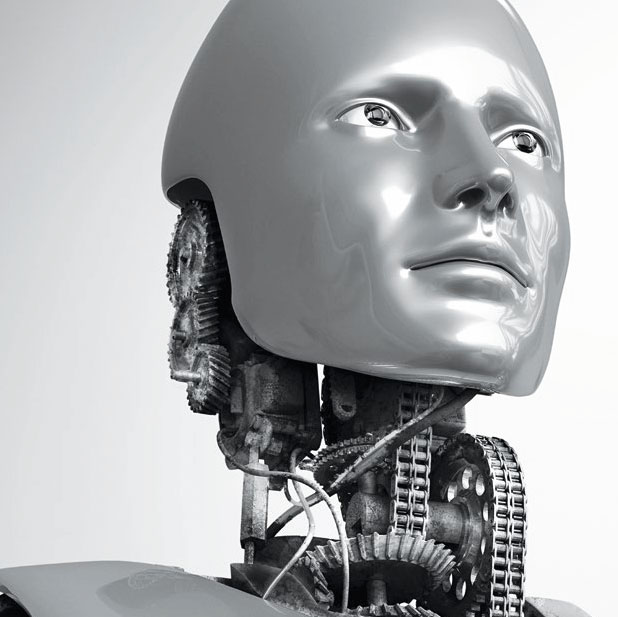 KOOHKERED DNA LLIEN MULAC SROTIDE SEIRES LACAN ANDTHE POSTHUMANEDITED BYSVITLANA MATVIYENKO, JUDITH ROOF The Palgrave Lacan Series Series Editors Calum Neill School of Psychology and Sociology Edinburgh Napier University Edinburgh, UK Derek Hook Duquesne University Pittsburgh, USA Jacques Lacan is one of the most important and influential thinkers of the 20th century. The reach of this influence continues to grow as we settle into the 21st century, the resonance of Lacans thought arguably only beginning now to be properly felt, both in terms of its application to clinical matters and in its application to a range of human activities and interests. The Palgrave Lacan Series is a book series for the best new writing in the Lacanian field, giving voice to the leading writers of a new generation of Lacanian thought. The series will comprise original monographs and thematic, multi-authored collections. The books in the series will explore aspects of Lacans theory from new perspectives and with original insights. There will be books focused on particular areas of or issues in clinical work.
KOOHKERED DNA LLIEN MULAC SROTIDE SEIRES LACAN ANDTHE POSTHUMANEDITED BYSVITLANA MATVIYENKO, JUDITH ROOF The Palgrave Lacan Series Series Editors Calum Neill School of Psychology and Sociology Edinburgh Napier University Edinburgh, UK Derek Hook Duquesne University Pittsburgh, USA Jacques Lacan is one of the most important and influential thinkers of the 20th century. The reach of this influence continues to grow as we settle into the 21st century, the resonance of Lacans thought arguably only beginning now to be properly felt, both in terms of its application to clinical matters and in its application to a range of human activities and interests. The Palgrave Lacan Series is a book series for the best new writing in the Lacanian field, giving voice to the leading writers of a new generation of Lacanian thought. The series will comprise original monographs and thematic, multi-authored collections. The books in the series will explore aspects of Lacans theory from new perspectives and with original insights. There will be books focused on particular areas of or issues in clinical work.
There will be books focused on applying Lacanian theory to areas and issues beyond the clinic, to matters of society, politics, the arts and culture. Each book, whatever its particular concern, will work to expand our understanding of Lacans theory and its value in the 21st century. More information about this series at http://www.palgrave.com/gp/series/15116 Svitlana Matviyenko Judith Roof Editors Lacan and the Posthuman Editors Svitlana Matviyenko Judith Roof School of Communication Rice University Simon Fraser University Houston, TX, USA Burnaby, BC, Canada The Palgrave Lacan Series ISBN 978-3-319-76326-2 ISBN 978-3-319-76327-9 (eBook) https://doi.org/10.1007/978-3-319-76327-9 Library of Congress Control Number: 2018934663 The Editor(s) (if applicable) and The Author(s) 2018 This work is subject to copyright. All rights are solely and exclusively licensed by the Publisher, whether the whole or part of the material is concerned, specifically the rights of translation, reprinting, reuse of illustrations, recitation, broadcasting, reproduction on microfilms or in any other physical way, and transmission or information storage and retrieval, electronic adaptation, computer software, or by similar or dissimilar methodology now known or hereafter developed. The use of general descriptive names, registered names, trademarks, service marks, etc. in this publication does not imply, even in the absence of a specific statement, that such names are exempt from the relevant protective laws and regulations and therefore free for general use.
The publisher, the authors and the editors are safe to assume that the advice and information in this book are believed to be true and accurate at the date of publication. Neither the publisher nor the authors or the editors give a warranty, express or implied, with respect to the material contained herein or for any errors or omissions that may have been made. The publisher remains neutral with regard to jurisdictional claims in published maps and institutional affiliations. Cover illustration: Peter Crowther/Alamy Stock Photo Printed on acid-free paper This Palgrave Macmillan imprint is published by the registered company Springer International Publishing AG part of Springer Nature The registered company address is: Gewerbestrasse 11, 6330 Cham, Switzerland Acknowledgements We would like to thank the Palgrave Lacan Series editors Derek Hook and Calum Neill for their support of this volume as part of the series and for designing a Lacanian niche in academic publishing on the first place. We would also like to thank Joanna ONeill and Grace Jackson for their expert guidance through the process. Our meeting during 2011 MLA Convention in Los Angeles was facilitated by our friend Benjamin Kozicki, and it led to an inspiring conversation about Lacan and posthumanism, in the midst of which we understood we wanted to co-edit a book.
We thank those scholars who responded to our initial call and shared this projects agenda. For a variety of reasons, the preparation of this volume took significantly longer than expected, so we are grateful to our contributors for their commitment to this project and for their patience. We appreciated the suggestions of the anonymous reader, who enthusiastically engaged with our proposal, which helped us to locate a gravity centre of this collec tion: the notion of post in posthumanism. We thank Judiths assistants Brooke Clark and Hannah Biggs for their help with copyediting. And finally, we thank Ellie Ragland for her Lacanian inspirations. vContentsSvitlana Matviyenko and Judith RoofLouis ArmandJudith RoofAllan PeroColin WrightBen WoodardviiviiiContentsSvitlana MatviyenkoJohn JohnstonNancy GillespieScott WilsonTimothy MortonEditors and ContributorsAbout the EditorsSvitlana Matviyenko is Assistant Professor of Critical Media Analysis in the School of Communication at Simon Fraser University, Canada.
She writes about history of science, cybernetics and psychoanalysis; the networking drive and user complicity; practices of resistance and mobilization; legacies of the Soviet techno-politics, including the Chernobyl catastrophe; information and cyber-war. With Paul D. Miller, she is co-editor of The Imaginary App (MIT Press, 2014) and a co-author, with Nick Dyer-Witheford, of Cyber-War andRevolution (forthcoming with Minnesota in 2019). Judith Roof is Professor and William Shakespeare Chair in English at Rice University. She is the author of seven monographs, most recently WhatGender Is, What Gender Does (Minnesota 2016) and The Comic Event: ComedicPerformance from the 1950s to the Present (Bloomsbury 2018). ixxEditors and ContributorsContributorsLouis Armand is the director of the International Arts Centre Prague and is the author, among other works, of Incendiary Devices: Discourses of the Other (1993), Literate Technologies: Language, Cognition, Technicity (2006) and Videology (2015). www.louis-armand.com. Nancy Gillespie is an analyst in private practice. Nancy Gillespie is an analyst in private practice.
She is a member of the Lacanian Compass, an affiliated group of the New Lacanian School. She is co-editor of the Lacanian Compass Express, has done English editing for several Lacanian journals and is guest editing a section of The Lacanian Review 5: TheDelights of the Ego. She has a PhD in literature and psychoanalysis from the University of Sussex in the UK and has published work on experimental writ ing and Lacanian analysis. John Johnston is Professor in the Department of English at Emory University. He is the author of The Allure of Machinic Life (MIT, 2008); Information Multiplicity: American Fiction in the Age of Media Saturation (John Hopkins UP, 1998); and Carnival of Repetition: William Gaddis TheRecognitions and Postmodern Theory (University of Pennsylvania Press, 1990). Johnston is an editor and translator of Literature, Media, Information System:Essays by Friedrich A.
Kittler (Routlege, 1997). Timothy Morton is Rita Shea Guffey Chair in English at Rice University. He gave the Wellek Lectures in Theory in 2014 and has collaborated with Bjrk, Haim Steinbach and Olafur Eliasson. He is the author of
Next page

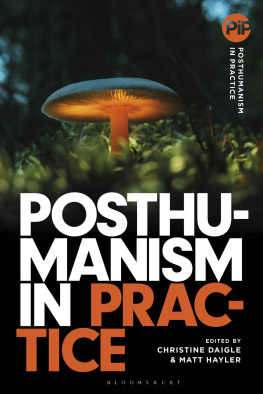
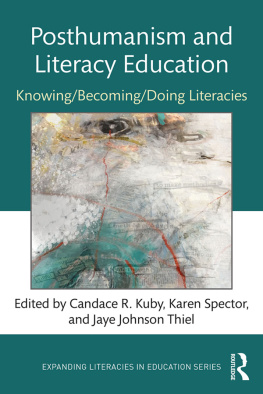
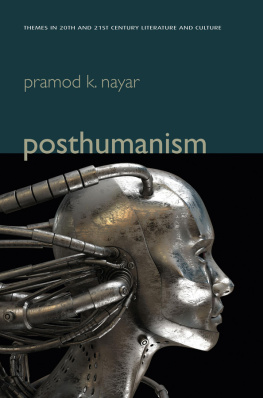
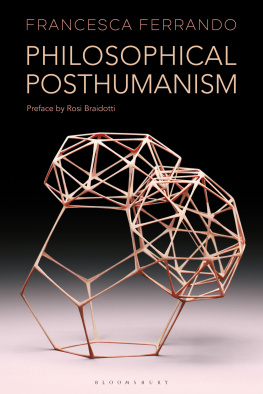


 KOOHKERED DNA LLIEN MULAC SROTIDE SEIRES LACAN ANDTHE POSTHUMANEDITED BYSVITLANA MATVIYENKO, JUDITH ROOF The Palgrave Lacan Series Series Editors Calum Neill School of Psychology and Sociology Edinburgh Napier University Edinburgh, UK Derek Hook Duquesne University Pittsburgh, USA Jacques Lacan is one of the most important and influential thinkers of the 20th century. The reach of this influence continues to grow as we settle into the 21st century, the resonance of Lacans thought arguably only beginning now to be properly felt, both in terms of its application to clinical matters and in its application to a range of human activities and interests. The Palgrave Lacan Series is a book series for the best new writing in the Lacanian field, giving voice to the leading writers of a new generation of Lacanian thought. The series will comprise original monographs and thematic, multi-authored collections. The books in the series will explore aspects of Lacans theory from new perspectives and with original insights. There will be books focused on particular areas of or issues in clinical work.
KOOHKERED DNA LLIEN MULAC SROTIDE SEIRES LACAN ANDTHE POSTHUMANEDITED BYSVITLANA MATVIYENKO, JUDITH ROOF The Palgrave Lacan Series Series Editors Calum Neill School of Psychology and Sociology Edinburgh Napier University Edinburgh, UK Derek Hook Duquesne University Pittsburgh, USA Jacques Lacan is one of the most important and influential thinkers of the 20th century. The reach of this influence continues to grow as we settle into the 21st century, the resonance of Lacans thought arguably only beginning now to be properly felt, both in terms of its application to clinical matters and in its application to a range of human activities and interests. The Palgrave Lacan Series is a book series for the best new writing in the Lacanian field, giving voice to the leading writers of a new generation of Lacanian thought. The series will comprise original monographs and thematic, multi-authored collections. The books in the series will explore aspects of Lacans theory from new perspectives and with original insights. There will be books focused on particular areas of or issues in clinical work.